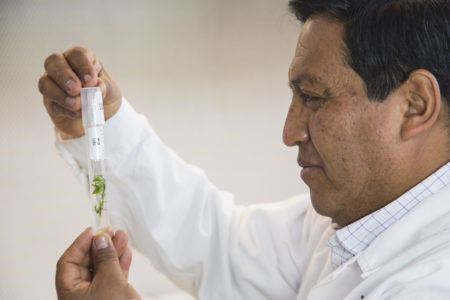Prevention, early detection, and the strengthening of scientific cooperation, are key factors in facing this challenge.
Lima, 22 October 2018 – The spread of crop pests and disease across borders has increased dramatically in recent years. Globalization, trade, and climate change, alongside reduced recovery capacity in production systems as a result of decades of agricultural intensification, have all played an important part in advancing the trend.
Crop disease can cause major damage to yields, in some cases even leading to total production loss and, if not controlled in time, can have a considerable impact on food security. The situation is aggravated further in developing countries, which typically have no contingency plans, where there can be millions lost in revenue, and serious levels of malnutrition. In Latin America it has been known for $7.1 trillion dollars and 13.5% of total crop production to be lost due to pest and disease in just 3 years[1].
 Phytosanitary surveillance and control measures at country level (SENASA) have been successful in preventing the entry of exotic pests and diseases. However, there is a latent risk due to the possibility of emergent, re-emergent or invasive pests and diseases arising, and so prevention (surveillance), early detection, and the strengthening of cooperation, are vital to coping with the problem and its immediate effects such as hunger and malnutrition.
Phytosanitary surveillance and control measures at country level (SENASA) have been successful in preventing the entry of exotic pests and diseases. However, there is a latent risk due to the possibility of emergent, re-emergent or invasive pests and diseases arising, and so prevention (surveillance), early detection, and the strengthening of cooperation, are vital to coping with the problem and its immediate effects such as hunger and malnutrition.
As a way to contribute increase awareness on the importance of phytosanitation locally and globally, the International Potato Center (CIP) and the Germplasm Health Units (GHUs) of CGIAR centers teamed up to organize the International Phytosanitary Awareness Week from Monday 22 to Friday 26 October in Peru. The aim – to create a scientific forum raising awareness about the phytosanitary challenges and organizational responsibilities in ensuring distribution of healthy seed, and the sustainable agricultural production that will contribute to the global fight against hunger and malnutrition.
This second annual meeting brings together institutions such as Peru’s National Agrarian Health Service, (SENASA), the National Institute for Agricultural Innovation (INIA) and the Community of Andean Nations (CAN) to take part in a variety of activities based around a main theme: “the Role of CGIAR Germplasm Health Units (GHUs) in the control of invasive pests and disease”.
Activities will inform Center staff about CIP’s Germplasm Health Unit and its role in the secure distribution of germplasm, and the importance of pathogens and pests in crop production. The week-long event also aims to secure links between institutions through the consolidation of a “Community of Practice” (CoP, for its acronym in English) fostering collaboration and exchange in such areas as: joint projects, agreements, technical-scientific support, and capacity building, among others. This will provide a ‘front line’ free flow of information to assist in decision making and facing upcoming challenges.
[1] Orke, E. C., H. W. Dehne, F. Schonbeck, and A. Weber. 1994. Crop production and crop protection: Estimated losses in major food and cash crops. Amsterdam: Elsevier
About CIP
The International Potato Center (CIP), with headquarters in Lima, was founded in 1971 as a root and tuber research-for-development institution delivering sustainable solutions to the pressing world problems of hunger, poverty and the degradation of natural resources. CIP is custodian to a collection of potato, sweetpotato and Andean roots and tubers including the world’s largest collection of potato diversity. CIP has regional offices in Peru, Ecuador, Kenia, India and China and works all over the world with projects in 30 developing countries across Asia, Africa and Latin America.
CIP is part of the CGIAR, a global research partnership for a food-secure future. CGIAR science is dedicated to reducing poverty, enhancing food security, improving human health and nutrition, and ensuring a more sustainable management of natural resources. Its research is carried out by 15 CGIAR Centers, in close collaboration with hundreds of partners, including national and regional research institutes, civil society organizations, academia, development organizations and the private sector. www.cgiar.org
Contact:
| Martin Morales Burson Cohn & Wolfe Peru Cel. 982939782 martin.morales@bm.com |
María Elena Lanatta International Potato Center Cel. 981187198 m.lanatta@cgiar.org |
